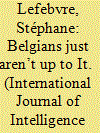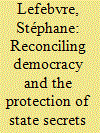|
|
|
Sort Order |
|
|
|
Items / Page
|
|
|
|
|
|
|
| Srl | Item |
| 1 |
ID:
153156


|
|
|
|
|
| Summary/Abstract |
“The Belgians just aren’t up to it,” said a French intelligence source anonymously after the 13 November 2015 terrorist attacks in Paris.1 Robert-Jan Bartunek “Belgium Hits Back at French Criticism Over Lax Intelligence,” Reuters, 17 November 2015, at
http://www.reuters.com/article/france-shooting-belgium-criticism-idUSL8N13C3OV20151117
, accessed 17 November 2015.
Surely frustrated by the connections surfacing between the attackers and Belgium, he or she may have had a point. Throughout the 1980s the Belgian intelligence services were routinely criticized, fairly or unfairly, for just about anything.2 “Every institution experiences difficulties at some time or another. The 1980s was just such a period […]. Now we need to pull ourselves together, overcome our difficulties, and go about restoring people’s confidence. We have learned the lessons of the past.” Nancy Ferroni, interview with SE Administrateur général Bart Van Lijsebeth, “Soulever un coin du voile du secret,” Le Vif/L’Express, 5 March 1999, p. 18.
In the 1990s, those services were thought, as a Belgian intelligence officer put it, to be operating “like something out of the Middle Ages.”3 Nancy Ferroni “Le Spy Blues,” Le Vif/L’Express, 5 March 1999, p. 16. In more recent years, Belgium has been increasingly seen as a hotbed of Islamic radicalization and as a staging ground for terrorist attacks.
|
|
|
|
|
|
|
|
|
|
|
|
|
|
|
|
| 2 |
ID:
145319


|
|
|
|
|
| Summary/Abstract |
As Poland emerged from decades of Communist rule, its political course was uncertain. The expectations among advanced democratic countries that Poland would evolve into a full-fledged democratic polity were certainly high, despite serious political and socio-economic challenges. After all, Poland lacked a democratic tradition and respect for the rule of law, and its political culture was long at ease with strong leaders and authoritarian institutions. Its economy was weak, its legal culture and judicial system were in need of rebuilding, and it suffered from political fragmentation.1 More importantly, without strong political institutions, a new and effective legal framework, and in-depth socio-economic reforms, a serious concern developed among would-be Polish reformers and astute foreign observers that the country's intelligence services could pose an obstacle to its democratic development, and endanger the political, social, economic, and human rights of its citizens. Ultimately, the intelligence services were indeed sources of controversy, political infighting, and alleged abuses, but not to the extent of preventing Poland from moving ahead as a recognized democracy within the polity of nations.
|
|
|
|
|
|
|
|
|
|
|
|
|
|
|
|
| 3 |
ID:
153167


|
|
|
|
|
| Summary/Abstract |
South Africa has had a tortuous legal past. Its racial discrimination and segregation system, initiated by colonial rulers, became legal under of the National Party’s system of apartheid from 1948 to 1994. Under the appearance of the rule of law, non-whites were marginalized in all aspects of life, forcibly confined to geographic areas, and prevented from participating in decisions affecting their country’s destiny.
|
|
|
|
|
|
|
|
|
|
|
|
|
|
|
|
| 4 |
ID:
080341


|
|
|
|
|
| Publication |
2007.
|
| Summary/Abstract |
This article discusses Russia's use of "illegals" for espionage purposes, using the recent Canadian case of one "Paul William Hampel." Unmasked in November 2006, his case of was reminiscent another one a decade earlier which involved two Russians who also operated under false Canadian identities. Although we do not know how much of a role simple luck or poor Russian tradecraft played in Hampel's case, that Russia is still using Canada for espionage purposes should not come as a surprise. One of the few tools Russia has absent a strong economy and rejuvenated armed forces, is its intelligence apparatus. Hampel's case should serve as a warning to all well-established advanced democracies: espionage is as important today as it ever was in the pursuit of a state's national interests
|
|
|
|
|
|
|
|
|
|
|
|
|
|
|
|
| 5 |
ID:
163798


|
|
|
|
|
| Summary/Abstract |
This article discusses the role of the discourse of law in legitimizing the protection of intelligence secrets. It draws on examples from the United Kingdom and the United States to illustrate rhetorical regularities with respect to the need to protect intelligence officers, agents, sources and methods, the effectiveness of intelligence agencies, international intelligence relationships and the effects of a mosaic of disclosed information. It concludes that judges produce specialized knowledge on state secrecy that plays a part in shaping the understanding of state secrecy in society.
|
|
|
|
|
|
|
|
|
|
|
|
|
|
|
|
|
|
|
|
|